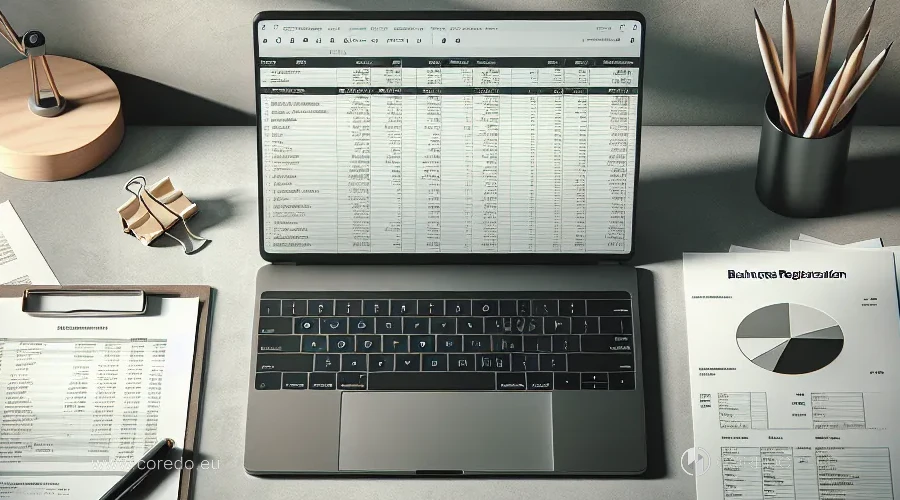
Nikita Veremeev
30.07.2025 | 6 min read
Updated: 30.07.2025
In 2024,
Germany confidently entered the top 5 European countries in terms of the number of new foreign companies: over the past 12 months alone, more than 77,000 new legal entities with foreign participation were registered. This figure is not just statistics but a direct reflection of the attractiveness of the German jurisdiction for international business. Why has company registration in Germany become a strategic choice for entrepreneurs from the EU, Asia, and CIS?
On one hand, Germany offers a unique combination of a transparent legal environment, access to the largest EU market, and a developed startup support infrastructure. On the other hand, strict regulatory requirements, a complex licensing system, and high costs for business support often become barriers to market entry, especially for small and medium businesses. How to start a business in Germany with minimal costs without losing legality and reputation? What pitfalls await foreigners when setting up a company in Germany, and how to avoid common mistakes?
Me: Nikita Veremeev, CEO and founder of COREDO. In 8 years, the COREDO team has completed over 350 projects on company registration in Germany, the Czech Republic, the UK, Estonia, Singapore, and Dubai. In this article, I share not only a structured step-by-step guide but also practical recommendations that will help you go from choosing the form of ownership to cost optimization and integration into the European market. If you are looking for real experience, proven solutions, and strategic ideas: I recommend reading the material to the end.
Company Registration in Germany: Main Stages and Minimal Costs

Starting a business in Germany for foreigners is not only a legal procedure but also a strategic project that requires careful preparation and a deep understanding of local realities. COREDO’s practice confirms: minimal costs for company registration in Germany are possible only with competent planning and strict adherence to the stages.
Choosing the Form of Ownership: GmbH, UG, AG, Which is Cheaper and Easier for Small Businesses
Choosing the legal form is a key stage determining not only the cost of opening a firm in Germany but also the requirements for share capital, management structure, and tax burden. The most popular forms are:
| Form of Ownership |
Minimum Share Capital |
Main Costs |
Features |
| GmbH |
€25,000 |
Registration fees, notary, document translation |
Optimal for small and medium businesses, capital can be paid in stages |
| UG (Mini-GmbH) |
from €1 |
Similar to GmbH but lower capital |
Requires annual profit reservation up to €25,000 |
| AG |
€50,000 |
High audit and management costs |
Suitable for large businesses and attracting investments |
COREDO’s experience shows that for small businesses and startups, the optimal form remains GmbH or UG. GmbH (Gesellschaft mit beschränkter Haftung) provides a balance between reputation, flexibility, and asset protection, while UG allows starting almost without capital investment but imposes restrictions on profit distribution.
Step-by-Step Guide to Registering a GmbH: How to Open a Firm with Minimal Expenses
The step-by-step guide to registering a GmbH includes the following stages:
- Choosing and Reserving a Name: Check uniqueness and reserve through the online portal Handelsregister.
- Preparation of Constitutive Documents (Gesellschaftsvertrag): Develop a founding agreement considering the specifics of the activity.
- Notarization of Documents: All founding documents must be certified by a German notary.
- Opening a Corporate Account in a German Bank: Deposit share capital and obtain confirmation for the trade register.
- Registration in the Trade Register (Handelsregister): Electronic submission of documents, payment of registration fees.
- Obtaining a Tax Number (Steuernummer) and VAT Number: Register with the tax office and get an identification number for VAT.
- Registration with the Chamber of Industry and Commerce: Payment of annual contributions and integration into the business community.
A solution developed by COREDO allows optimizing this process through digital tools, electronic document management, and remote interaction with notaries and banks.
Minimum Share Capital and Its Optimization: How Much Needs to Be Invested Initially
The minimum share capital for registering a GmbH in Germany is €25,000, of which at least €12,500 must be deposited at registration. The remaining amount can be contributed later as the business grows. For UG, €1 is sufficient; however, 25% of the net profits must be reserved annually until reaching €25,000.
COREDO’s team recommends using staged capital contributions and choosing banks offering preferential conditions for startups, which significantly reduces initial costs. It’s important to note: the share capital must be placed in a separate business bank account, and its use before registration is prohibited.
The Cost of Opening a Firm in Germany: Mandatory and Hidden Costs
The cost of opening a firm in Germany consists of:
- Registration fees (from €150 to €400 depending on the region)
- Notarial services (from €500 to €1,200)
- Translation and legalization of documents (from €300)
- Opening a corporate account (from €100)
- Annual contributions to the chamber of industry and commerce (from €150)
- Legal address (from €50 per month)
COREDO’s experience shows: cost optimization is possible by choosing a region with minimal fees, using electronic services, and startup partnership programs.
How to Reduce Costs for Business Registration in Germany: Practical Tips

Opening a business in Germany with minimal costs is an achievable task if modern tools are used and regional peculiarities are taken into account.
Choosing a Region and Online Registration: Where It Is Cheaper and Faster to Open a Business
The cost of registering a company in Germany depends on the federal state. For example, in Berlin and Leipzig, registration fees and legal address costs are lower than in Munich or Frankfurt. Online registration of a company in Germany through specialized platforms can reduce the timeframe from 4–6 weeks to 7–10 days and lower logistics and notary service costs.
In practice, COREDO has implemented projects where choosing a region and online document submission saved up to 30% of the startup budget.
Outsourcing Accounting and Legal Services: When Is It Beneficial?
Outsourcing accounting and legal support for a business in Germany is an effective way to reduce ongoing expenses and ensure compliance with international reporting standards (IFRS). For small businesses, it’s more beneficial to outsource financial record-keeping, tax declaration preparation, and annual balance than to maintain a full-time accountant.
COREDO’s outsourcing solutions allow clients to save up to 40% on administrative and tax expenses while minimizing the risk of penalties for reporting violations.
Optimizing Tax Burden and Obtaining Benefits for New Companies
Proper tax planning in Germany starts with choosing the optimal taxation system and timely registration of the tax number (Steuernummer). New companies and startups may be eligible for tax benefits, subsidies, and grants, especially in innovative and technological sectors.
COREDO’s experience shows: integration into European business associations and participation in startup support programs not only reduce the tax burden but also expedite market entry into the EU.
Documents and Licenses for Opening a Business in Germany: What a Foreigner Will Need

Business in Germany for foreigners requires special attention to document preparation and adherence to migration requirements.
What Documents Are Needed to Register a GmbH in Germany
To register a GmbH, the following are necessary:
- Constitutive documents (Gesellschaftsvertrag)
- Certified copies of passports of founders and directors
- Confirmation of the company’s legal address
- Bank confirmation of share capital deposit
- Application for registration in the trade register (Handelsregister)
All documents must be translated into German and notarized. COREDO’s team facilitates the legalization and translation of founding documents, speeding up registration and reducing refusal risks.
Obtaining Licenses and Permits: Specifics for Different Types of Activities
Certain types of businesses in Germany require special licenses: financial, insurance, cryptocurrency, payment, as well as permits for commercial real estate. Compliance (AML/KYC) and banking compliance for non-residents play an important role.
COREDO’s practice confirms: preliminary due diligence and preparation for AML checks speed up license acquisition and prevent account blockages.
Opening a Checking Account in a German Bank: Requirements and Pitfalls
Opening a checking account in a German bank is one of the most challenging stages for foreigners. Banks require confirmation of fund sources, a business plan, and the passing of KYC and AML procedures. Additional documents are often requested: tax residency certificates, corporate structures, and confirmation of business reputation.
COREDO’s team has developed interaction algorithms with banks that increase the likelihood of opening a corporate account in a European bank even for non-residents, minimizing refusal risks.
Legal Support for Business in Germany: How to Avoid Mistakes and Penalties

Reliable legal support for business in Germany: a guarantee of long-term stability and investment protection.
AML/KYC Compliance: How to Ensure Conformity and Avoid Account Blockages
Adherence to AML/KYC requirements is a mandatory condition for opening a business in Germany and accessing banking services. Financial transaction monitoring, implementation of internal control procedures, and employee training in international reporting standards (IFRS), all minimize the risk of account blockages and penalties.
COREDO’s team implements comprehensive compliance solutions tailored to the client’s activity specifics and German regulatory requirements.
Common Mistakes in Business Registration and Operations: How to Avoid Them
Frequent mistakes include incorrect preparation of founding documents, untimely reporting submission, neglecting corporate governance and due diligence requirements. Such errors lead to penalties, account blockages, and loss of business reputation.
COREDO’s recommendations: use professional legal consultations for business, regularly conduct audits of corporate procedures, and monitor legislative changes.
Scaling and ROI: How to Assess the Effectiveness of Business Registration in Germany

Company registration in Germany is an investment, the effectiveness of which is determined not only by initial costs but also by the opportunities for scaling to EU markets.
How to Calculate the Payback Period (ROI) When Opening a Company in Germany
To calculate the ROI of business registration in Germany, consider:
- Cost of opening a firm (registration fees, notary, support services)
- Annual expenses (accounting services, fees, taxes)
- Expected revenues and tax benefits
- Potential subsidies and grants
COREDO’s experience shows: the average payback period for small businesses is 12–24 months with proper financial accounting and tax burden optimization.
Opportunities for Business Scaling to EU Markets and International Agreements
Germany is an ideal entry point for scaling a business in the EU due to international agreements to avoid double taxation, the ability to register branches, and integration into European business associations. Company registration in Germany opens access to major markets, facilitates license acquisition, and simplifies labor migration of employees.
COREDO’s team supports clients at all stages of scaling: from branch registration to European market integration and international tax optimization.
Key Takeaways and Practical Recommendations for Entrepreneurs
Company registration in Germany: a strategic step requiring an expert approach and deep understanding of local realities. Practical steps verified by COREDO:
- Choose the optimal form of ownership (GmbH or UG) to minimize startup costs.
- Use online registration and choose regions with low fees.
- Outsource accounting and legal support to reduce ongoing expenses.
- Implement modern compliance (AML/KYC) and financial accounting tools.
- Conduct regular due diligence and monitor legislative changes.
- Utilize tax benefits, subsidies, and grants for new companies.
- Plan scaling to EU markets, considering international agreements and integration into business associations.
COREDO’s experience shows: only a comprehensive approach, process transparency, and professional support at all stages allow opening a business in Germany with minimal costs and maximum efficiency. If you are seeking a reliable partner for company registration in Germany and further support, COREDO’s team is ready to offer solutions proven by international practice.




